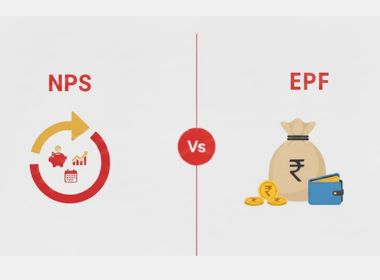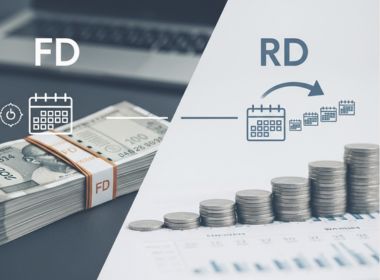Search Suggestions
- Gold Loan
- Money Transfer
- Mutual Funds

What is a Recurring Deposit (RD)? Features, Benefits & How It Works
There is something reassuring about setting aside your money, knowing that your future plans or sudden financial exigency will not catch you off guard. It gives you a sense of relief, control and a quiet confidence that your finances are on the right track. Yet, savings always feel like something you will do later, like when you start earning more, spend less or get through the month.
Table of Content
- What is a Recurring Deposit?
- Features of Recurring Deposits
- How Does it Work?
- Save Your Funds With Muthoot Finance
That is precisely where a Recurring Deposit (RD) comes in. It simplifies savings by turning it into a manageable monthly habit.
You can start saving by investing as low as INR 100, with no upper limit. Just small, regular monthly deposits that add up to something meaningful over time.
What is a Recurring Deposit?
A recurring deposit or RD is a term deposit where you deposit a fixed amount every month for a specific period, predetermined by you. At the end of this term, you will receive the total amount you have saved along with the interest you have earned over time.
Unlike lump sum deposits, where you need to deposit all at once, RDs are designed for consistency in savings. RD account holders do not need to have a large sum ready to invest; instead, they can simply invest in recurring deposits. It is an excellent tool for individuals with a steady income, those who want to save regularly or a first-time investor aiming for a goal-based savings plan with less market volatility and guaranteed returns. If you are unsure about which savings plan suits you better, understanding the differences between a recurring deposit and a fixed deposit helps you make a sound decision based on your financial goals and spending habits.
Features of Recurring Deposits
An RD has several key features that make it an attractive investment tool for individuals at various stages of financial planning. Multiple features that make recurring deposits so dependable are as follows:
Fixed Monthly Contributions
Individuals opting to open an RD account contribute a fixed amount every month, which encourages them to maintain consistency and build a regular savings habit without overwhelming their budget.
Customisable Tenure
Investors have the option to choose a deposit period that aligns with their goals, ranging from as short as six months to as long as ten years.
Assured Interest Rates
The interest rate on RD is fixed at the time of account opening, so the earnings you make remain predictable throughout the chosen tenure.
Quarterly Compounding of Interest
The interest is compounded every quarter in case of RDs, allowing your money to grow steadily over the period you choose without any additional input from your side.
Nomination Facility
RDs also come with a nomination option, allowing investors to assign a nominee to ensure their savings are transferred smoothly in the event of an unexpected occurrence.
Option for Premature Withdrawal
While RDs encourage investors to stay invested till the end of the tenure, which means you do not have the option to withdraw your RD early if needed, in case you wish to withdraw your money before maturity, this may come with minor penalties or reduced interest.
Benefits of Recurring Deposits
An RD is a viable option for investors who wish to cultivate a habit of regular savings while also earning returns. It is particularly suited for individuals who prefer a structured approach to saving without the complexities of market-linked investments. The key benefits of recurring deposits include:
Encourages Financial Discipline
By requiring a fixed deposit every month, RDs help you develop a disciplined saving habit that gradually becomes second nature.
Accessible to All Income Levels
Since the monthly investment amount can be as low as INR 100, individuals from all income levels can invest in RD and inculcate a habit of regular savings to save for rainy days.
Offers Risk-Free Returns
RDs are not affected by market fluctuations, which means your savings are stable and guaranteed. When comparing recurring deposits vs fixed deposits, both offer risk-free returns; however, RDs have the added advantage of promoting regular savings without requiring a lump sum investment upfront.
Supports Goal-Based Planning
If you plan to save for your child’s education, a family function or a future purchase, RDs help you set aside money systematically for specific objectives.
Easy to Open and Manage
Opening an RD account is straightforward and does not involve lengthy paperwork or complex processes, making it ideal even for first-time investors.
How Does it Work?
Suppose you open an RD where you deposit INR 100 every month for two years, with a 6.5% annual interest rate compounded quarterly. Each of your deposits earns interest from the month it is made until the maturity date.
At the end of the tenure, you receive:
- The total principal (INR 1200 in this case)
- Plus the accumulated interest
The best part about investing in RD is that you do not have to track or manage anything in between. The predetermined monthly deposits will be automatically debited from your account, after which you can watch your savings grow gradually.
Since the interest is compounded every quarter, which makes the calculation a bit complicated, several banks and NBFCs provide RD calculators to help you estimate your maturity value even before you begin.
- Insurance
- Group Insurance
- Health Insurance
- Home Insurance
- Vehicle Insurance
- Life Insurance
- Travel Insurance
- Shop Insurance
CATEGORIES
OUR SERVICES
-

Credit Score
-

Gold Loan
-

Personal Loan
-

Cibil Score
-

Vehicle Loan
-

Small Business Loan
-

Money Transfer
-

Insurance
-

Mutual Funds
-

SME Loan
-

Corporate Loan
-

NCD
-

PAN Card
-

NPS
-

Custom Offers
-

Digital & Cashless
-

Milligram Rewards
-

Bank Mapping
-

Housing Finance
-

#Big Business Loan
-

#Gold Loan Mela
-

#Kholiye Khushiyon Ki Tijori
-

#Gold Loan At Home
-

#Sunherisoch
RECENT POSTS

Understanding Gold Bees: How it Works, Net Asset Value, Returns and More
Know More
Multi Cap and Flexi Cap Mutual Funds: How Are They Different?
Know More
Online Personal Loan vs. Offline Personal Loan - Which Is Better for You?
Know More
10 Tips to Improve Chances of Personal Loan Approval
Know More
10 Factors Affecting Mutual Fund Performance Explained Simply
Know More
10 Key Factors That Affect Your Personal Loan EMI
Know More
What Is Fine Gold? Meaning, Purity (999), Uses & Price Explained
Know More
Gold vs Silver: Which is Better as an Investment?
Know More
Why Gold Is a Safe Haven Asset: Meaning, Benefits & Real Examples
Know More
Gold or Bitcoin - Best Investment for Value Retention
Know MoreFIN SHORTS

The Best 7 SIF Funds of 2026: A Better Way to Invest
Know More
Gold Price Hits ₹1,40,000: How It Impacts Gold Loan Amounts
Know More
How to Check Loan Number: Step-by-Step Process
Know More
How to Open an SIP Account: Online and Offline Process
Know More
How Do I Apply for MSME Certification Online in India?
Know More
7 Important Reasons to Choose Hallmark Gold When Buying Jewellery
Know More
What Are Co-Pay and Deductibles in Insurance Policies?
Know More
Should You Take a Loan Against Your Mutual Fund or SIP?
Know More
Top 5 Best Mid-Cap Mutual Funds to Watch in 2026
Know More
Are Personal Loans Right for Retirees? Key Points to Consider
Know More
What Happens to a Personal Loan After the Borrower Dies?
Know More
Best Loan Choices for Credit Scores of 580 and Below
Know More- South +91 99469 01212
- North 1800 313 1212





